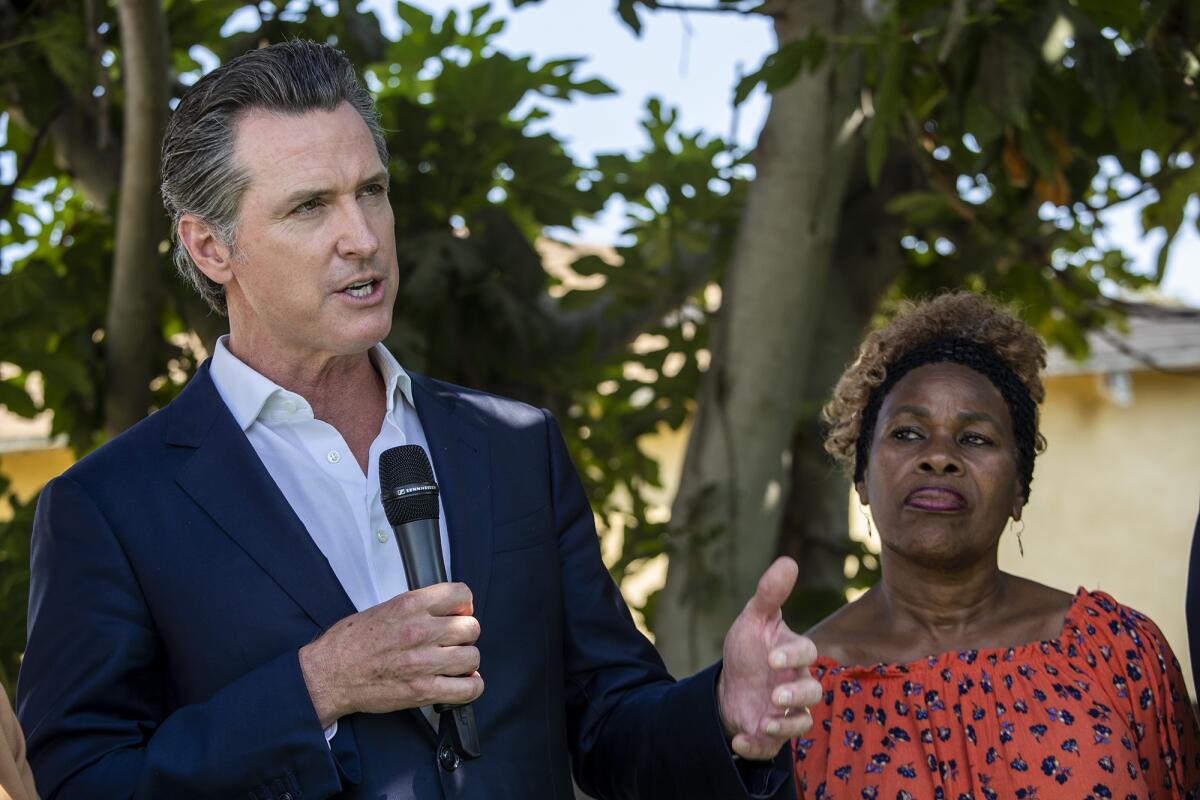Gov. Newsom urges PG&E to give customers rebates after power outages

- Share via
SACRAMENTO — Gov. Gavin Newsom on Monday urged Pacific Gas & Electric to provide $100 rebates to residential customers affected by last week’s unprecedented power shut-offs, asserting that the company’s communication failures “put lives at risk.”
“PG&E has an obligation to the customers affected by the company’s inadequate preparation and failed execution of this power shut-off event,” Newsom wrote in a letter sent to PG&E Chief Executive Bill Johnson. “Lives and commerce were interrupted. Too much hardship was caused.”
Newsom’s missive came two days after PG&E said it had restored electricity to the more than 700,000 customers and 2 million people in 35 counties throughout Northern and Central California who lost power.
Also Monday, the California Public Utilities Commission ordered PG&E to take corrective action after the largest shut-off in state history, including increasing the speed at which power is restored and creating more effective communication protocols with local governments. PG&E began cutting power early Wednesday and some customers were left in the dark until Saturday.
In a letter to the company, CPUC President Marybel Batjer said PG&E failed to incorporate many of the state’s recommendations related to coordination, communication and ways to minimize impacts on customers.
“Failures in execution, combined with the magnitude of this event, created an unacceptable situation that should never be repeated,” Batjer wrote to the company.
Batjer directed PG&E to file weekly updates until all of the issues the CPUC brought up have been addressed. She requested several top executives, including the company’s CEO and chairman of the board, attend an emergency CPUC meeting in San Francisco on Friday.
As a new tool to prevent wildfires, PG&E has been proactively shutting down power in anticipation of strong winds, hot temperatures and dry conditions that create an increased risk for its equipment to spark blazes. The sweeping outages forced schools and businesses to close and left elderly customers or those who use life-sustaining medical equipment scrambling to make backup plans.
Newsom and others criticized the outages as too broad and poorly executed, affecting both areas with a history of wildfires and others less exposed to risk.
“PG&E used a sledgehammer when it should have used a scalpel,” said Char Miller, a professor of environmental analysis at Pomona College and a widely recognized wildfire policy expert.
Miller said PG&E appeared to be protecting itself from liability from any wildfires that would have been linked to its equipment and sending a political message to state leaders who have blamed the company for causing blazes.
“So you think we’re problematic if we start a fire, imagine what we can do if we stop them?” Miller said of PG&E’s message. “It sends a punch to the gut of the state.”
PG&E’s website crashed multiple times during the outages, call centers experienced long wait times, and the company struggled to provide notifications to local governments and emergency personnel, Newsom said. Newsom also called for PG&E to provide $250 rebates to small-business customers.
“It was clear from the start that PG&E implemented this extraordinary measure with astounding neglect and lack of preparation,” Newsom said in a separate letter to Batjer.
Newsom’s announcement on Monday marked the second time the governor had publicly lashed out at the utility since it drew the ire of customers in areas of the state that lost power.
State Sen. Mike McGuire (D-Healdsburg) said PG&E’s mismanagement, increasing wildfire threats and a history of weak oversight by the CPUC have created a “worst-case scenario” for the state.
McGuire said the state needs to force PG&E to speed up efforts to harden its equipment, perform necessary vegetation management and modernize its grid in high-hazard wildfire zones — work anticipated to take a decade to perform.
He and other lawmakers hope to introduce legislation early next year to address several problems related to shut-offs. It could could include setting criteria that utilities must meet before flipping off the lights, requiring companies to make accurate lists of medically fragile patients and develop effective mapping technology to pinpoint outages. Deeper conversations about the future of the electricity model in California also should be discussed, McGuire said.
“It’s time to have a serious conversation about the size and long-term success of this utility that has lost all credibility with its ratepayers,” McGuire said. “You’d think the largest electricity utility in America could do better, but it’s obvious that they can’t.”
More to Read
Sign up for Essential California
The most important California stories and recommendations in your inbox every morning.
You may occasionally receive promotional content from the Los Angeles Times.














